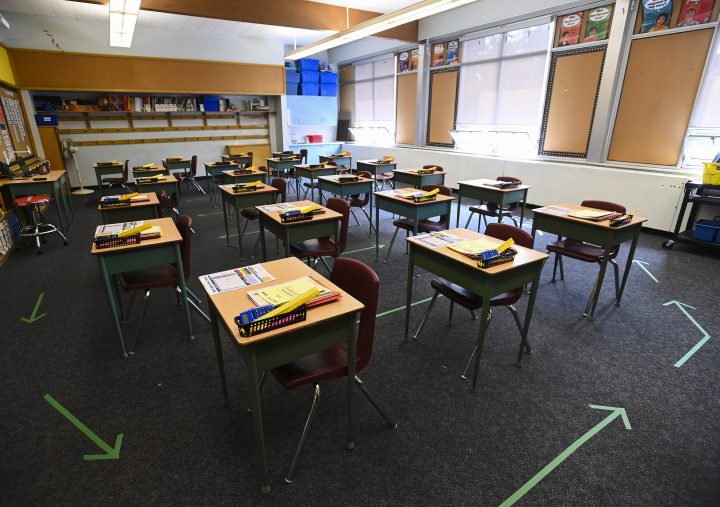A report commissioned by Education Minister Jean-François Roberge shows that school service centres and school boards have taken the appropriate measures to ensure indoor air quality in Quebec schools.

The report, published on Friday, showed a high compliance rate with control measures including ventilation system maintenance, replacement of filters, the installation of carbon monoxide detectors, radon concentration measurements and identifying materials likely to contain asbestos, to name a few.
In a news release, the education ministry announced additional tests to measure carbon dioxide levels in classrooms would be carried out by service centres starting on Dec. 1 to ensure current standards are being met.
In the event of non-compliance, service centres are being asked to quickly carry out the necessary work or required adjustments.
The issue of air quality in schools has been top of mind amid the ongoing novel coronavirus pandemic.
Earlier this week, a collective of doctors and scientists released an unofficial study carried out in Montreal-area schools that showed 75 per cent of classrooms showed significant ventilation problems and carbon dioxide levels above acceptable levels, which could favour the transmission of COVID-19.

Get weekly health news
Physicist Nancy Delagrave explained that when people breathe and talk they emit carbon dioxide, little droplets and aerosols that float in the air.
In poorly-ventilated areas, their concentration increases through accumulation. So the higher the carbon dioxide levels, the higher the potential risk for transmission of the virus.
In a statement released Friday, however, Roberge took a moment to reassure the population.
“Our school environments are healthy and safe,” he said. “In the context of the COVID-19 pandemic, it is even more essential to ensure adequate air quality in all schools.
“I am reassured to note that the data compiled shows that the control mechanisms put in place are effective.”
Québec Solidaire MNA Christine Labrie, however, wasn’t buying it.
“How can the minister maintain that our schools are healthy and safe, when he has just asked for CO2 tests, and he will not have the results for several weeks,” she said in an email to Global News.
“Now he is surmising the results of tests that are not even done yet. It is a lack of respect on his part, and it is irresponsible to have waited so long to demand these tests.”
The Centrale des syndicats du Québec (CSQ), representing close to 110,000 school employees, was also critical of report released on Friday, saying it sidesteps the issue of actual air quality in schools.
The union said it was pleased guidelines and recommendations were in place to ensure air quality, such as the inspection of ventilation systems and the opening of windows to allow for air circulation but did express some doubts as the the ability of schools to implement those measures.

The CSQ said many schools don’t have ventilation systems, and that opening windows in the winter isn’t ideal. Furthermore, some classrooms don’t even have windows.
In his statement, Roberge pointed to recent government investments including $1.6B for school renovations and $20 million for the maintenance of ventilation systems.
Roberge indicated that the school network could take advantage of the holiday season to carry out any work that might be required.









Comments
Want to discuss? Please read our Commenting Policy first.